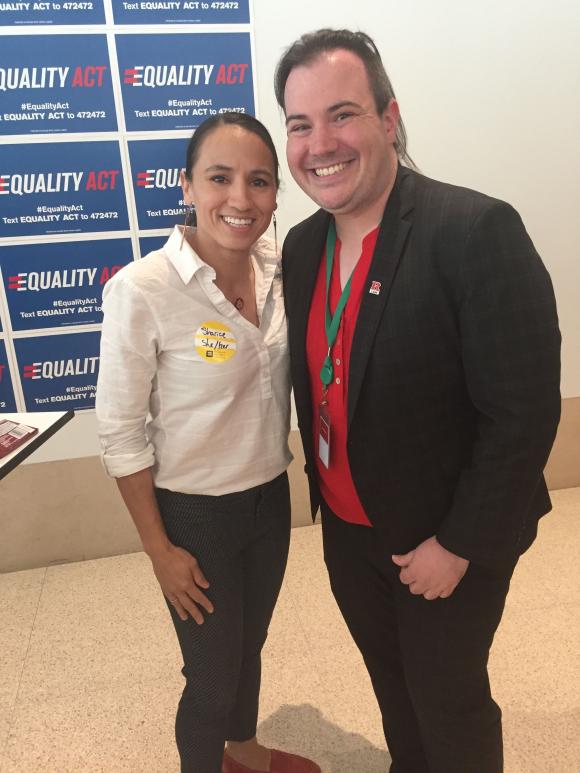
Conrad (right) with Congresswoman Sharice Davids (KS-3), the first LGBT Native American elected to the House of Representatives.
Life is wild sometimes.
Over the course of a grueling second year of law school, I wrote a note on a topic that I was passionate about—transgender access to healthcare—noting specifically how the story was not over until a new regulation passed. A federal judge staid a case pending the proposal of a new regulation implementing the Affordable Care Act’s nondiscrimination provision. An early draft punted on the issue: “Only time will tell how the Administration will handle this!” I hadn’t thought about it since submitting.
This summer finds me in Washington, D.C. working as a McCleary Law Fellow with the Human Rights Campaign, the largest LGBTQ advocacy organization in the country. The current headache is that same new regulation that I had punted on.
Next thing I know, I’m sitting in a room with a dozen other people trying to coordinate the national response and comments to combat the proposal. In less than six months, I went from writing a somewhat underwhelming note to sitting at the table with the same people who are leading the national charge against the proposal.
Needless to say, I was freaking out.
In addition to that strategy meeting, I have watched from the gallery as the House of Representatives passed the Equality Act; commemorated the anniversary of Brown v. Board of Education steps away from where that decision was made; and worked on everything from religious exemptions to civil rights laws to the nationwide move to ban gay and transgender panic defenses in criminal law; all at a pace that I’m sure would make even those working at firms blush.
I’ve learned that policy advocacy is an entirely different animal from trial or appellate advocacy; while the facts and logic are the same, the tactics and landscape are vastly different. We are not convincing one judge or even twelve jury members of the facts of our case; we are trying to convince as many as 535 individuals from across the country that our experiences should be acknowledged, that our lives are in danger, and that a change should be made. Where an attorney represents a client in one dramatic story, we are steeped in the tales of thousands of clients across the country, all crying out for justice.
What is so striking, however, is that policy advocacy is tried in the court of public opinion as much as it is in the legislature. While I’m working to get out the most recent draft of a comment, I’m also running lines for the information video that asks individuals to submit their own comments to combat the new regulation.
This experience has been tough, to say the least. The forced growth I have undergone in just these few weeks have been more intense than any one class in law school so far. The best analogy I can draw is to starting law school all over again. But just as I felt two years ago, I am more invigorated and alive than I have ever felt before.
The view of the Washington Monument from my bedroom doesn’t hurt either.
